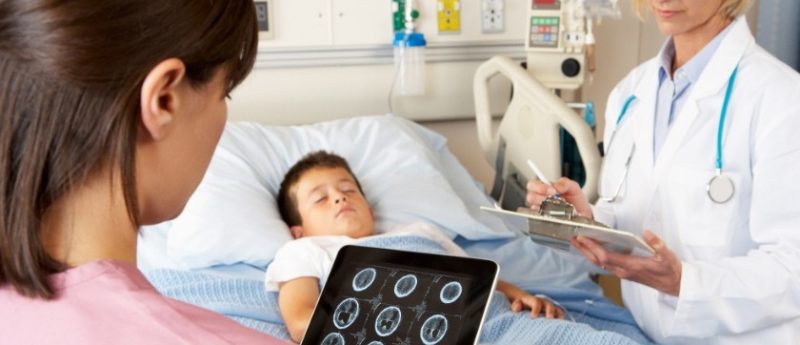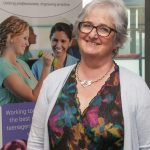Nursing young people with cancer: an interview with Sue Morgan MBE

You are a founding member of the Teenagers and Young Adults with Cancer (TYAC) organisation. Could you give us a brief overview of the organisation?
TYAC is a registered charity and the UK’s only membership body open to all professionals who are involved in the care of teenagers and young adults with cancer. The group provides education on best practice, shares new developments and distributes the latest resources; it aims to train and support its members to provide the very best care possible. It also aims to improve the quality of life and likelihood of survival for young people with cancer.
You were one of the first teenage and young adult nurse specialists in the country and have previously co-authored a paper: Nursing young people with cancer: What is “different” about it? Could you tell us about any differing considerations that should be taken into account when treating AYA cancer patients compared to adult cancer patients?
Young people are at a time of life when their bodies are changing, they are learning how to manage their place in the world, moving from dependence on parents/carers to independent living and are in the midst of their education. They are also conscious of how they look, how to fit in with their friends. They are exploring relationships and starting to look to the future. It is a time of real flux, and if you add a cancer diagnosis, with all the uncertainty that it brings, their needs become complex and require expertise to care for them.
AYA cancer care is about working with young people, with all of the above considerations, and guiding them through each hurdle. AYA nurses should be mindful that this population need care delivered by experts who are equipped with the skills to effectively communicate with them. We also have to consider and care for the family, parents, friends and carers, as a diagnosis affects the whole family.
You are a co-author on the paper: Teenagers and young adults with cancer in Europe: from national programmes to a European integrated coordinated project. How does the level of care differ across Europe for AYA cancer patients?
The UK has been the leading force for developing AYA services. However, in the past 10 years many other countries are following our lead and are working towards specialist AYA units and specific services. We know that France, Italy and Spain have done a lot of work and that several have a membership group, similar to TYAC. However, there are areas that have not been able to do any of this work – for example our colleagues in Romania really struggle to develop services due to a lack of funding and resources.
There are several ways in which we can share practice and help those who are starting out. There is a European initiative, The European Network for Teenagers and Young Adults with Cancer (ENTYAC) which aims to bring countries together and share practice. There is also an international Global Accord with the UK, Australia and the US that holds an annual conference where practice can be shared across the globe.
Could you tell us about the main challenges that currently hinder optimal care to this group of patients?
In the UK, we have 13 Principal Treatment Centres (PTC) which have AYA cancer services and bespoke units caring for those aged up to 25 years. According to NICE Guidance from 2005, those aged 13–18 years must have their treatment at a PTC. Others, where possible, may choose where they would like to have their care i.e. either in the PTC in bespoke AYA Units or in a designated hospital nearer to their home.
The main challenges for delivering optimal care is a lack of funding for specialist staff in some areas, as well as a lack of understanding from the professionals, mainly in the adult field, about the needs of young people with cancer. This can result in the PTCs not knowing about a young person and individuals may not know that they can have access to AYA care and also be treated alongside adults, rather than solely at an AYA unit.
What progress is being made in overcoming these challenges?
Every PTC in the UK has multidisciplinary teams that are specific to AYA cancer care – this has built up over the years. Teenage Cancer Trust have funded the development of units across the UK. The trust also now funds AYA nurses and Youth Support Workers across the UK and CLIC Sargent (UK) funds social workers. These staff work closely together, alongside NHS funded employees, to deliver expert care. This has all led to vast improvements of AYA care but there are still improvements to be made.
However, it is still the case that many young patients may be treated in their local hospitals, rather than coming to a main AYA unit. This may be out of choice, or because they would rather be treated nearer home, or because they have not been offered the choice by the referring teams. In some cases, we can go out to the young person and help them make a choice about where they may wish to be cared for and if they choose to stay nearer home, we can provide AYA care for them in their locality, by outreaching from the Principal Treatment Centres. With more staff being trained and funded to work specifically with teenagers and young adults, we can now outreach from the PTCs to provide this care and information. The number of AYA patients known to us is constantly increasing, so we are able to increase our outreach but we still have a way to go.
What advancements do you hope to see in nursing care for AYA cancer patients over the next 5-10 years?
I would like to see:
- An increase in the number of young people referred to us and an increase in the number we care for.
- More nursing staff who are educated in caring for AYAs with cancer – looking at succession planning.
- A growing network of nurses who work together and share practice across the UK and beyond.
- AYA Cancer care is a multidisciplinary specialty so, all disciplines must work very closely to improve the care that we offer.
- More nurses publishing their work and research.
- More nurses sharing work on an international platform.
Sue Morgan MBE. Teenage Cancer Trust Nurse Consultant
 Sue has been working in the field of Teenage and Young Adult Cancer for the past 20 years. She was a founder member of TYAC (the UK’s only membership organisation for professionals who work with this age group) and has been a board member/Trustee ever since. She is a very proud parent of the young people’s conference ‘Find Your Sense of Tumour,’ which happens twice annually and reaches around 400 young people each year. She has been a part of the team leading the successful development of TYA cancer services in Leeds and the Yorkshire and Humber region, along with an innovative outreach service to all young people.
Sue has been working in the field of Teenage and Young Adult Cancer for the past 20 years. She was a founder member of TYAC (the UK’s only membership organisation for professionals who work with this age group) and has been a board member/Trustee ever since. She is a very proud parent of the young people’s conference ‘Find Your Sense of Tumour,’ which happens twice annually and reaches around 400 young people each year. She has been a part of the team leading the successful development of TYA cancer services in Leeds and the Yorkshire and Humber region, along with an innovative outreach service to all young people.
Sue has presented at many conferences locally, nationally and internationally and, with others, has ensured that the model of care to which we all aspire in the UK, is shared across the world. She also sits within a number of national TYA groups, boards and advisory committees in the UK, all of which promote the on-going development of TYA cancer care.
More recently, Sue is working in teenage developments across the disease spectrum, especially in Leeds. She helps to facilitate the Leeds Hospitals Youth Forum (UK), has been working with others to develop the recently launched Leeds Children’s Hospital TV www.lchtv.com and is one of the leads in the implementation of Transition services across the Leeds Hospitals.
Sue attributes the success of this growing interest and development of the young people’s specialty in hospitals to the ‘par excellence’ teamwork amongst dedicated multi professionals and is very proud and honoured to have been a part of it all.





